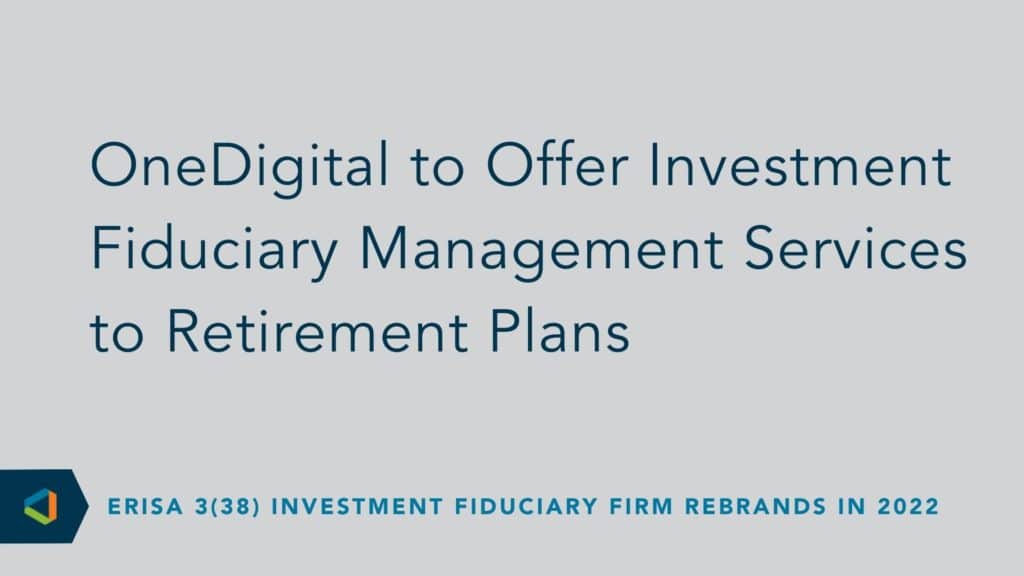Better Benefits, Lower Costs
Why Having an Investment Fiduciary is So Important
Why Having an Investment Fiduciary is So Important
This article was originally published on The Retirement Daily on 3/21/23.
It's become increasingly important for employers to understand the distinction between registered investment advisers and 3(38) Investment Fiduciaries.
The recent SECURE Act 2.0 will have a dramatic impact on how retirement plans will operate for years to come. With 90+ provisions that heavily revolve around plan design, operations and administration, employers will want to ensure they don't lose sight of having a prudent investment selection and monitoring process. After all, there are approximately 15,000 registered investment advisers in the United States. However, only some of these are 3(38) investment fiduciaries, who provide investment offerings within a retirement plan.
The Department of Labor requires a 3(38) Fiduciary to do whatever is in the best interest of the participants of the plan. A distinguishing factor of a 3(38) Investment fiduciary from other fiduciaries is that 3(38) Investment Fiduciaries have discretionary control over the plan’s investments, whereas others do not have that same level of control.
What are the roles and responsibilities of a 3(38) Investment Fiduciary?
A 3(38) investment fiduciary's role is to ensure that all investments and decisions around investments are prudent and in the best interest of employees participating in the plan. An investment fiduciary has many roles that help them achieve their overall goal of setting up a company's retirement plan for success from an investment standpoint.
One of those functions is to create an organizational structure for selecting, monitoring and replacing investments. The fiduciary will hold investment committee meetings to oversee the investments. Another important function is to create an Investment Policy Statement (IPS), which is the governing document in which all investment choices are made. All decisions need to comply with that original document. This structure helps keep investments within the overall standards of the plan and organization.
Not only do 3(38) Investment Fiduciaries set up great programs and documents, but they also select and monitor the investments to make sure they are appropriate specifically for a retirement plan environment. They continue to benchmark the plan’s investments and replace the funds when necessary. This continual process is crucial because it requires the investments to go under review on a regular basis to see if they still meet the requirements and are in the best interest of the plan participants.
This fiduciary duty was addressed in the important Tibble v Edison International case that went to the Supreme Court in May 2015. The Supreme Court held that an ERISA fiduciary has a duty to continuously monitor the prudence of investment options in a qualified retirement plan, separate and distinct from their duty to select investment options prudently initially. This decision is still impacting and guiding 3(38) fiduciaries today.
Does hiring an investment fiduciary completely absolve you of your liability as a plan sponsor?
It’s a common misconception that as a plan sponsor, an investment fiduciary can completely absolve you of liabilities. Even though when a plan sponsor hires an ERISA 3(38) Investment Fiduciary, they have outsourced all the liability for selecting and monitoring the investments to that fiduciary, the plan sponsor still retains the responsibility for selecting and monitoring that outside fiduciary. They need to make sure that fiduciary has the appropriate qualifications and credentials and can stand behind their decisions for your plan. It's important when outsourcing your investment fiduciary that you evaluate a variety of criteria and ask yourself the following questions:
- What are their levels of liability insurance?
- What are the credentials of the key consultants?
- How many years of plan-level experience do they have as a 3(38) investment fiduciary?
- Have they been disciplined by regulatory authorities?
- Does their liability insurance specifically cover them as ERISA 3(38) investment managers?
- Do the firm or related companies receive any payments from money managers they select or consider for selection?
Why is it important to have an Investment Fiduciary?
With the SECURE Act 2.0 taking effect and the ever-changing environment of retirement, an investment fiduciary helps to give your retirement plan structure and guidance to help you and your business make the right decisions. An investment fiduciary allows you the peace of mind to know that all the decisions around investments in your plan are being made and have been vetted and appropriately reviewed and that you have documentation to support those decisions if ever challenged.
An investment fiduciary puts their client and their participants first. They are looking to provide the best investment opportunities, meet the company's needs and help follow all guidelines set forth by governing bodies and the plan document. There is no better time to contact an investment fiduciary to help you stay compliant and on top of everything that will come with the SECURE Act 2.0.
Want to learn more about 3(38) Investment Managers? Check out this Fiduciary Academy webinar: Considerations When Hiring and Monitoring a 3(38) Investment Manager.
Investment advice offered through OneDigital Investment Advisors LLC, an SEC-registered investment adviser and wholly owned subsidiary of OneDigital.




